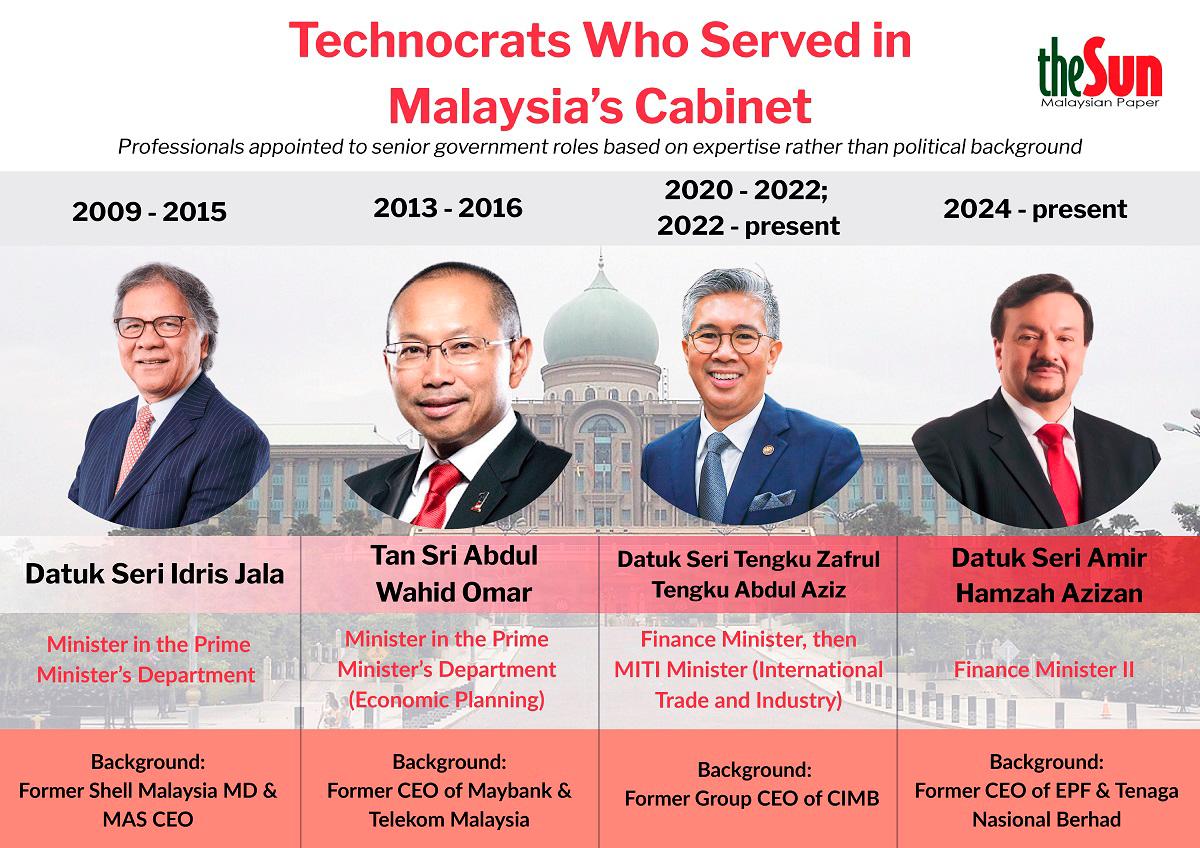PETALING JAYA: As Malaysia grapples with ongoing governance and policy hurdles, public interest is mounting over whether bringing more technocrats into the Cabinet could enhance decision-making and restore trust.
The recent appointment of Datuk Seri Amir Hamzah Azizan as Second Finance Minister has added momentum to the debate, with many lauding his corporate track record for injecting competence and credibility into government.
Political analysts say the shift reflects a growing demand for result-oriented leadership, especially in technical ministries where expertise may outweigh political savvy. They also say that while a technocrat-led Cabinet is not out of the question, Malaysia’s political culture, legal constraints and patronage networks would dictate how far the model can be pushed.
The matter has become more pressing with the current vacancies in two key ministries – Economy and Natural Resources and Environmental Sustainability – following the resignations of Datuk Seri Rafizi Ramli and Nik Nazmi Nik Ahmad. Amir Hamzah has since been appointed as acting Economy minister to temporarily fill the gap.
Universiti Teknologi Malaysia political analyst Assoc Prof Dr Mazlan Ali said technocrats and professionals often outperform traditional politicians, who tend to rely more on public appeal than subject-matter expertise.
“They have strong backgrounds in key areas like finance, economics, science and technology, making them better suited for portfolios such as finance, economy, energy transition, health and science and innovation.”
However, Mazlan acknowledged that such appointments could ruffle feathers among seasoned politicians who may feel sidelined. As a potential compromise, he proposed limiting technocratic roles to no more than three core ministries, each supported by a deputy minister from a political party.
“The technocrats must be genuinely qualified, influential and have proven credentials.
“It’s possible, but it has to be a hybrid, blending professionals with politicians.
“The prime minister can then strike a balance between political stability and capable governance.”
Nusantara Academy of Strategic Research senior fellow Prof Dr Azmi Hassan shares a similar view, noting that Malaysia’s democratic structure limits on appointing ministers from outside the political sphere.
“The issue is that very few members of parliament are actually experts in their field. The talent pool is limited.
“Technocrats like Amir Hamzah or even Abdul Wahid Omar delivered results because they weren’t bogged down by political entanglements.
“But expanding their numbers is tricky since they first have to be appointed as senators, and those slots are few and far between.”
Azmi said for key ministries such as finance, international trade and industry, defence and education, technical expertise should take precedence over political affiliation, allowing ministers to work with minimal interference.
He noted that bringing technocrats into a predominantly political system comes with challenges, particularly around political legitimacy and public accountability.
“The key is to appoint senators with minimal political affiliations. Otherwise, it undermines the credibility technocrats are meant to bring.”
International Islamic University Malaysia associate professor Dr Syaza Shukri, also a fellow at the ISEAS–Yusof Ishak Institute, said while public hunger for professional leadership is rising, especially among urban and middle-class voters, political realities remain deeply entrenched.
“Even if Malaysians want more technocrats, decisions are still shaped by patronage. It’s not about picking the most competent person, but someone close to the power structure. “Would a technocrat be truly free to make decisions without political interference?”
Syaza added that while professionals can offer crucial technical input, they still require the support of politicians who hold electoral legitimacy and public trust.
“Politicians often prioritise what will get them re-elected, while technocrats may push for long-term policies that aren’t popular in the short term.”
She also said younger voters, often seen as more progressive, don’t necessarily back technocratic leadership across the board.
“Some youths still prefer a politician they can identify with over a technocrat they
barely know.
“Identity politics and party loyalty still play a big role in shaping voter preferences.”









